Symposium Report: "Thucydides Trap and US-China Strategic Competition"
In order to create conditions for students to deepen their understanding of the concept of the Thucydides Trap, the views for and against it, and its impact on the US-China strategic competition, and to increase general awareness of students on US foreign policy, on the impact of US-China competition on the security situation of the Indo-Pacific region, Faculty of International Relations organized the Symposium Report: "Thucydides trap and US-China strategic competition" at 18:00, Saturday, October 30, 2021 by online form via Zoom platform.
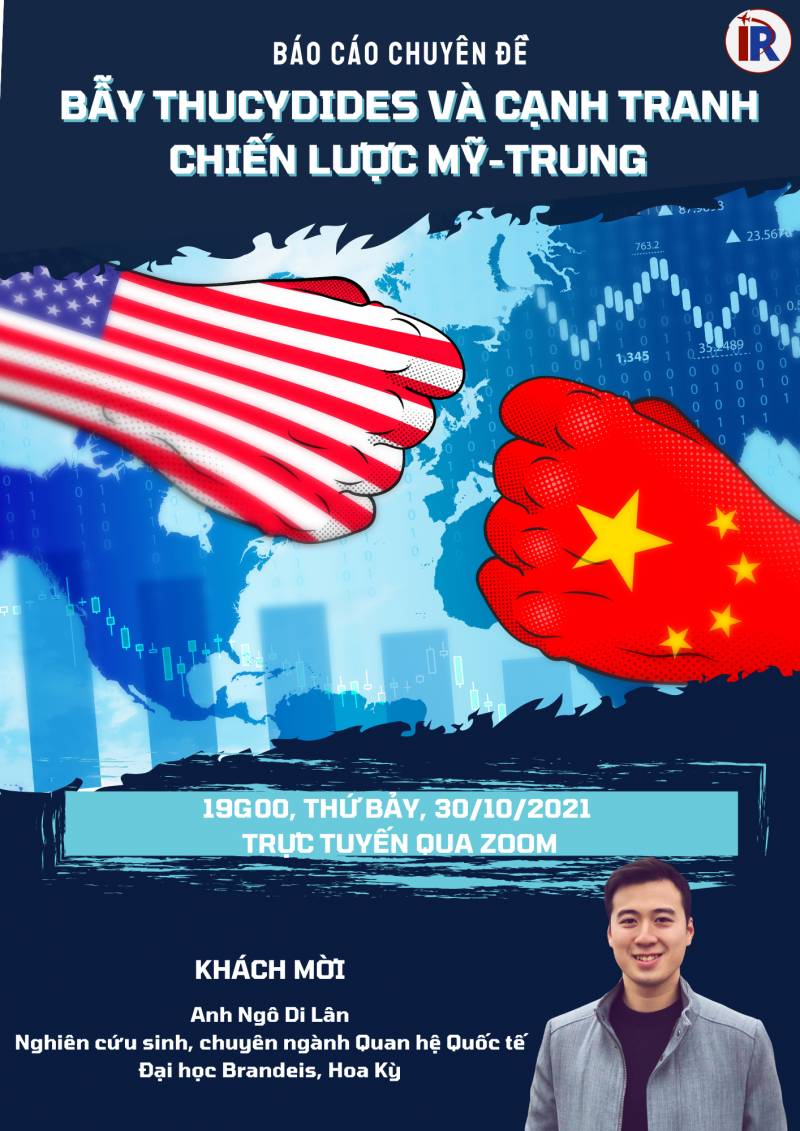
The talk was attended by the Dean of the Faculty of International Relations, lecturers and students of the Faculty of International Relations - UEF. In particular, the Report session attracted the participation of students majoring in International Relations from the Diplomatic Academy of Vietnam and the University of Social Sciences and Humanities, Vietnam National University, Ho Chi Minh City. The speaker of the Report Meeting was Mr. Ngo Di Lan, PhD student, majoring in International Relations, Brandeis University, USA, through the lead and introduction of MSc. Nguyen The Phuong, Lecturer of the Faculty of International Relations.
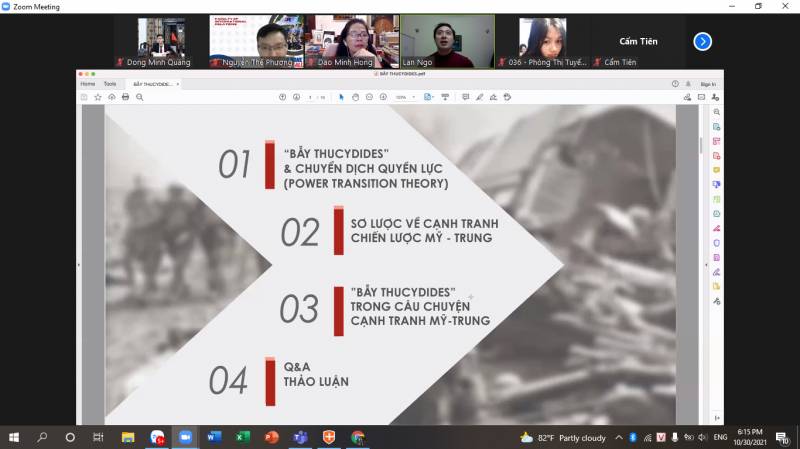
The content of the talk revolved around providing and explaining the Thucydides trap concept; examine the effectiveness of applying the concept of the Thucydides trap in explaining the US-China strategic competition; Especially, the talk helped the students answer the question whether the Thucydides trap is the optimal prism in analyzing the US-China competition? In order to concretize the above main contents, Mr. Lan's sharing includes 04 parts: Thucydides Trap and power transfer; US-China competition profile; the applicability of the Thucydides trap to the analysis of US-China competition; question and answer section.
At the beginning, Mr. Lan analyzed the concept of Thucydides trap for the students. “Trap” means a situation that is difficult to get out of; Thucydides is a Greek historian. The "Thucydides trap" is a concept that implies that war is a natural tendency when a new center of power emerges threatening to replace the old one. The "Thucydides Trap" is named after the ancient Greek historian Thucydides, who made his observations of the Peloponnese war between the newly emerging city-state Athens and the old ruling power, Sparta. This war caused the ancient Greek civilization to collapse. Thucydides said: "It was the rise of Athens and the fear it caused in Sparta that made war inevitable". It was this statement that gave meaning to the later concept of "Thucydides' Trap".
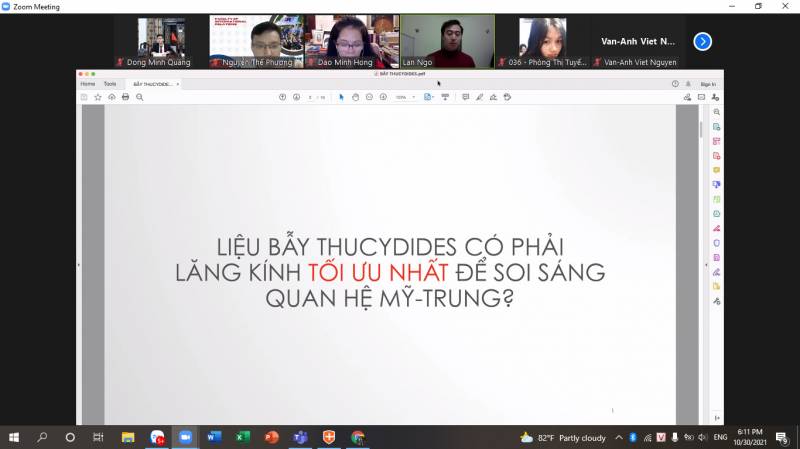
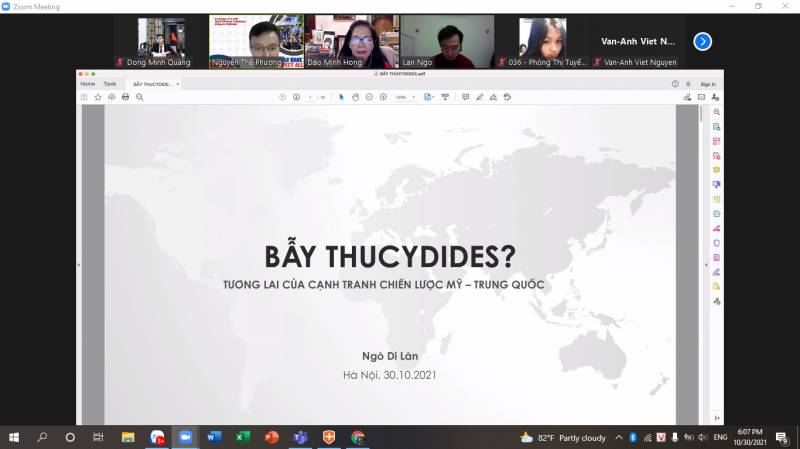
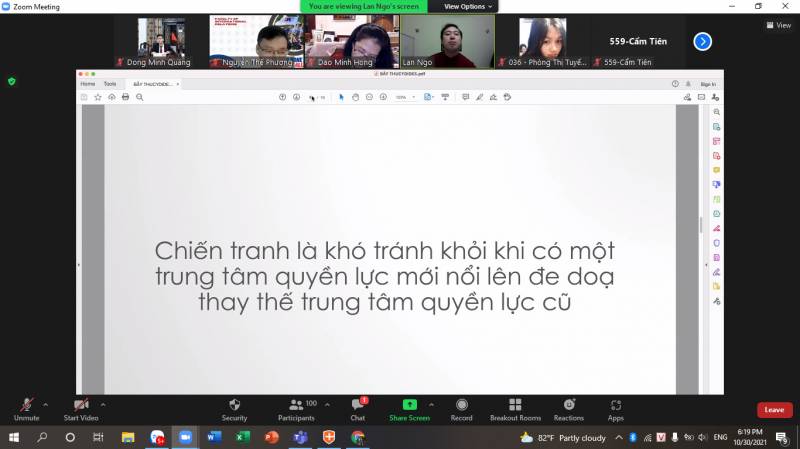
Next, the speaker shared about the theory of power shift. The father of this theory is A.F.K. Organski with his book World Politics (1958). Accordingly, the international system is arranged in an order based on the relative power between states. This system includes: hegemony, first-class powers, mid-range regional powers, and small states. Power transition theory holds that war occurs when a first-class power becomes strong enough to challenge the hegemon, so the great power will rise to wage war to overthrow the hegemon.
To understand the applicability of Thucydides' trap to the analysis of My Trung's strategic competition, first of all, Mr. Ngo Di Lan outlined the main features of this competitive process. The US-China strategic competition began after the end of the Cold War and began to take shape from the 2008 economic crisis. Competition accelerated at the end of the Obama era and peaked at the beginning of the presidency. Trump. The origin of competition comes from the rise of China, besides that the US has strategic interests in protecting its position as the world's number one power, and at the same time, the US and China have differences. , opposing ideology, culture, language, history, ethnicity.
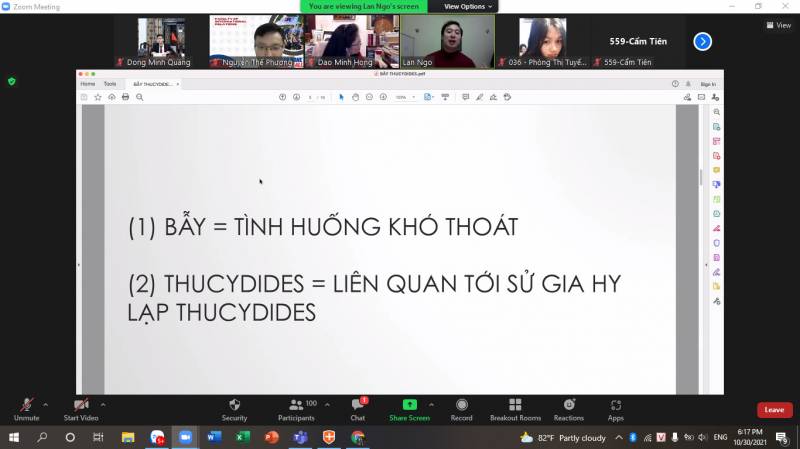
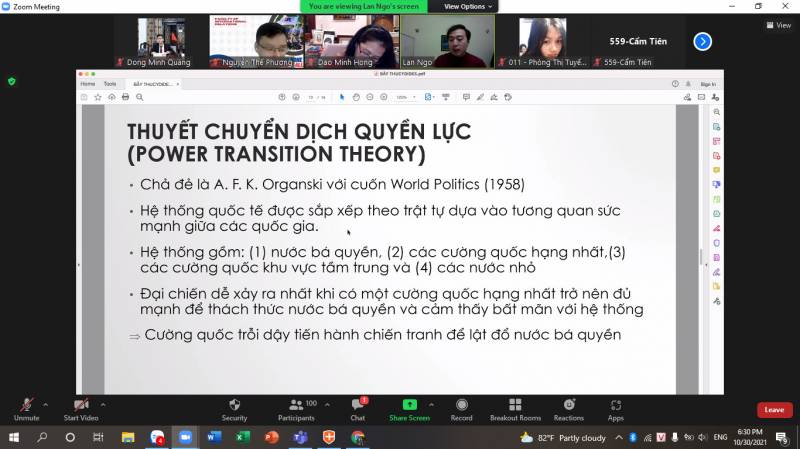
To answer the trap question of whether Thucydides is the optimal prism in analyzing US-China competition? Mr. Lan pointed out some inadequacies in the concept of Thucydides trap for students. Specifically: (1) there is no solid basis to assert that the concept of Thucydides' Trap as defined by Allison actually exists; (2) there is no specific mechanism to link factors at the structural layer (change in power) and decision-making to specific issues; (3) there is always a >0% probability of war between the US and China but not related to the rise of China; (4) the long-term trend is that China will weaken (in terms of relative and absolute)
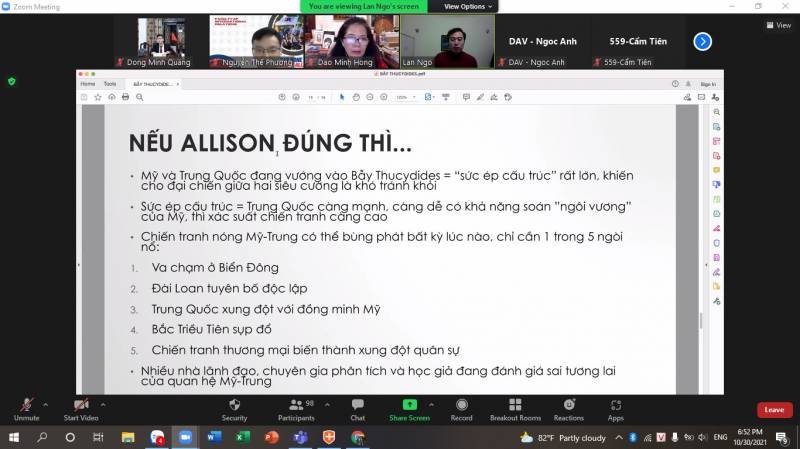
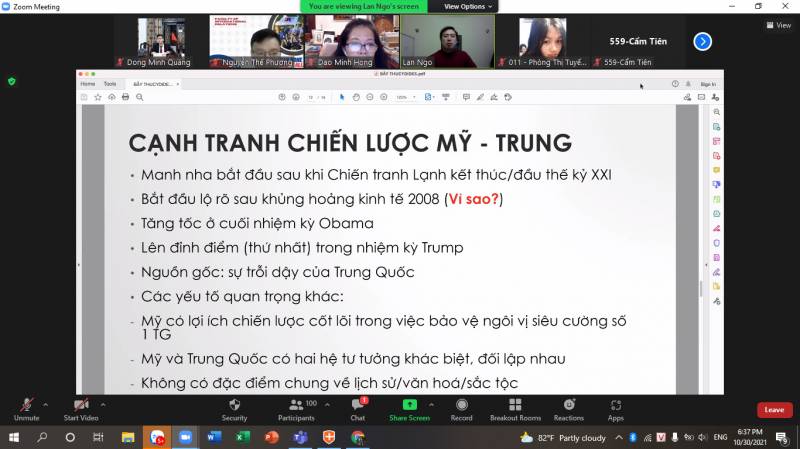
Through the above analysis, the speaker concluded the key points that students should note: (1) the concept of Thucydides trap has no solid basis in both history and theory; (2) people like Graham Allison exaggerate the risk of war breaking out in US-China relations; (3) the exaggeration of the risk of war will bring significant consequences if it convinces the US leadership, making the US become more reticent in its foreign moves; (4) in terms of reality, consider the possibility of China suddenly weakening, feeling that it has fallen but has a window of opportunity to defend its position; (5) Power transition is an important factor but only one of many factors to consider when assessing the future of major power relations.
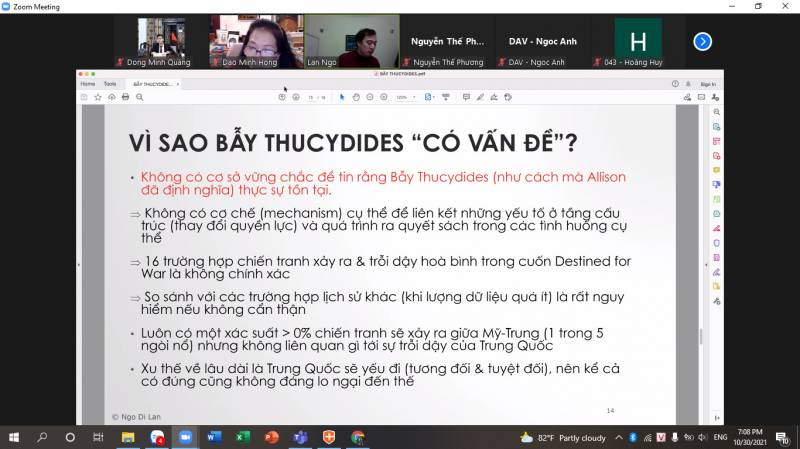
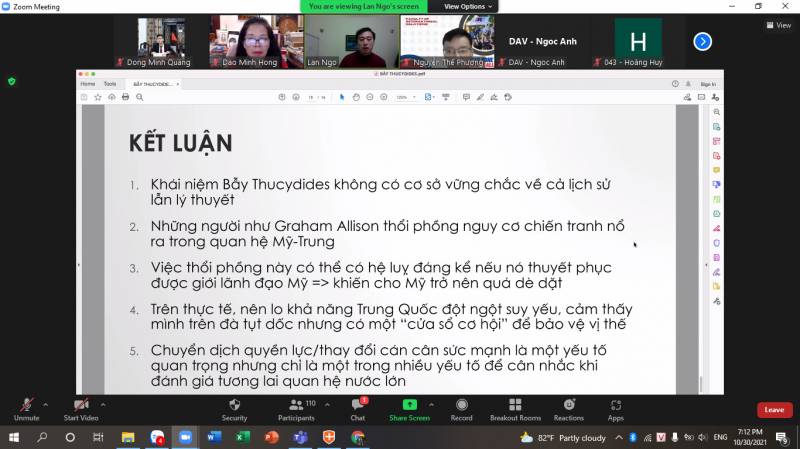
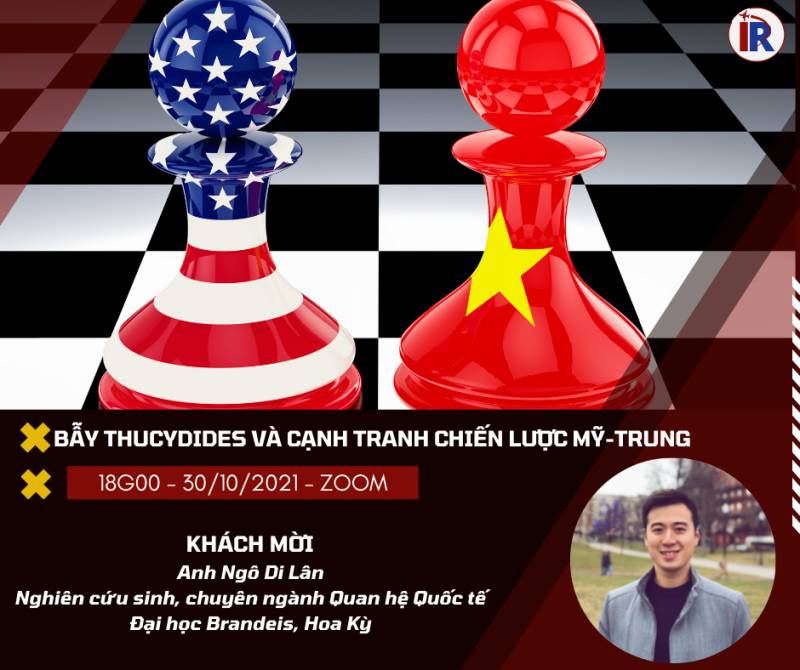
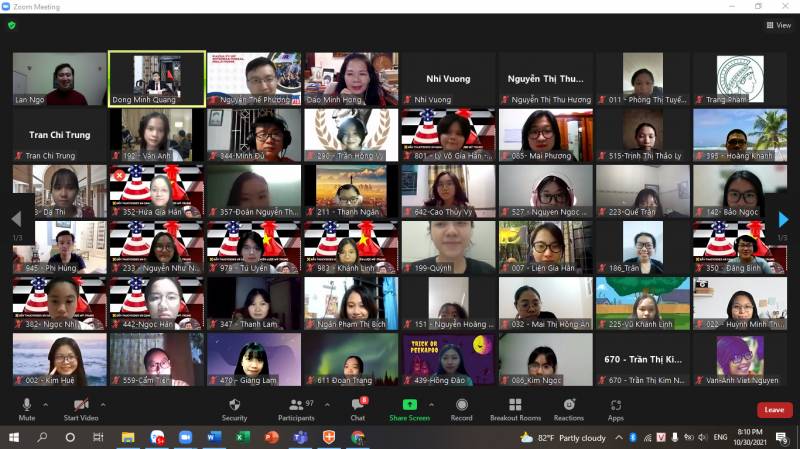
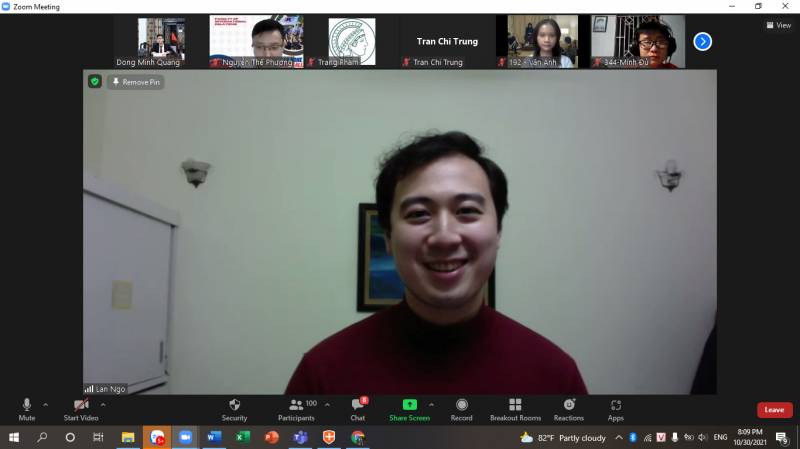
This report session also ended the series of seminars in the Asia - Pacific Security subject of the Faculty of International Relations. It is hoped that through the issues presented in the recent reports, it has helped the students gain more useful knowledge and new perspectives on national security issues, security hotspots, conflicts. conflicts and tensions in the Asia-Pacific region. This is an activity to help students build a foundation of basic and specialized knowledge, serving learning and research in the future.












